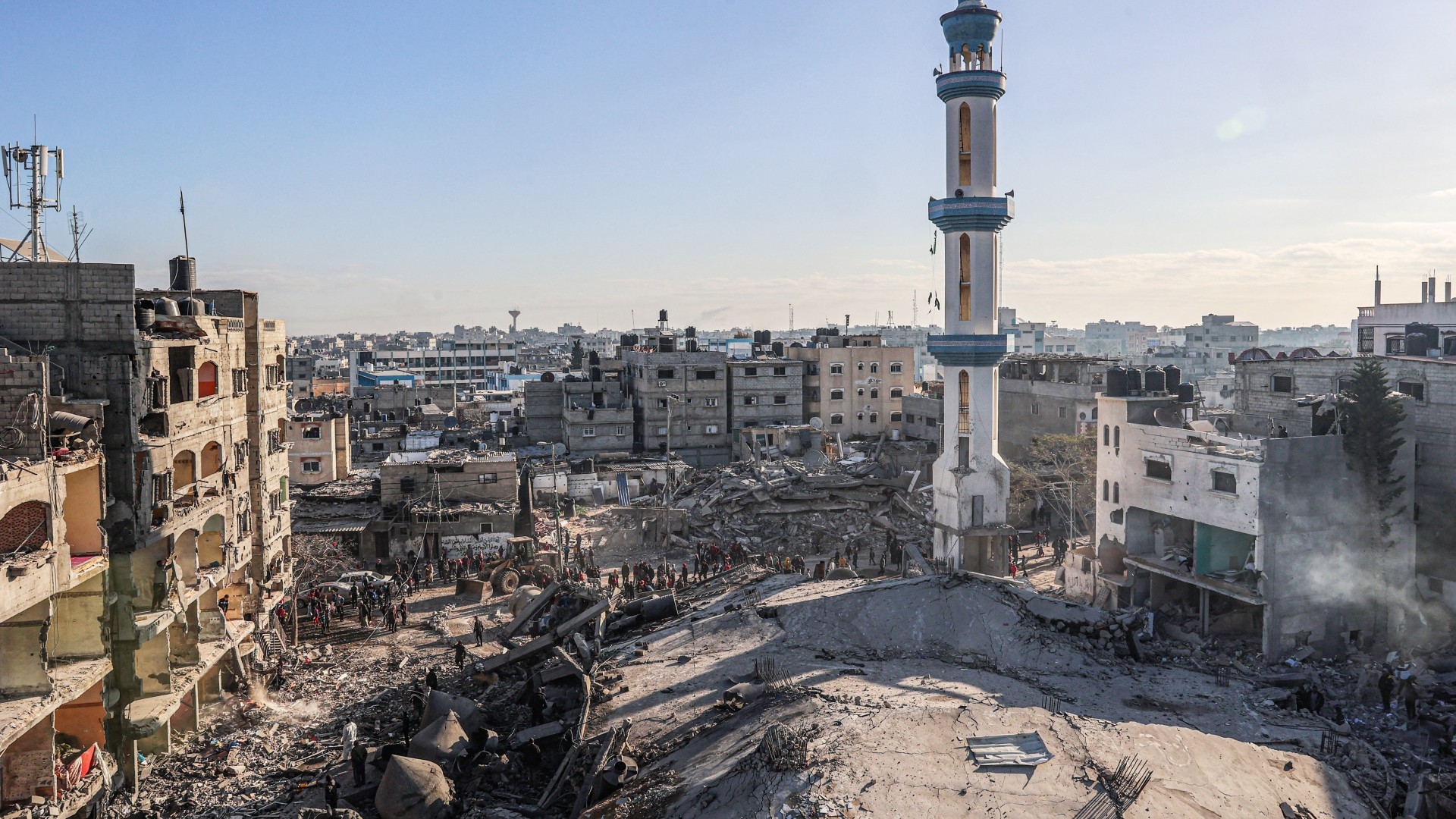Israel-Palestine live: Israel bombs Unrwa building in Gaza

Live Updates
More than 29,092 Palestinians have been killed since 7 October, said Gaza’s Health Ministry on Monday, confirming that yet another grim milestone had been crossed.
At least 107 Palestinians have been killed in Israeli strikes across Gaza in the past 24 hours
The ministry said that more than 69,028 others have been wounded since Israel launched its brutual campaign in the beseiged Strip.
It said that Israel had commited “nine massacres” against families in Gaza in the last 24 hours and that Israeli forces had prevented ambulances from reaching the wounded.
Qatar's Foreign Ministry spokesperson Majed al-Ansari has criticised the Israeli Prime Minister Benjamin Netanyahu for suggesting that Doha was standing in the way of the release of Israeli captives in Gaza.
On Sunday Netanyahu suggested that Qatar was not doing enough to pressure Hamas to release the captives.
Ansari said the comments were “nothing but an attempt to stall and prolong the war” in Gaza.
“The Israeli Prime Minister knows very well that Qatar has been committed from day one to mediation efforts, ending the crisis and freeing the hostages,” Ansari said in a post on X.
“We affirm that Qatar will continue its mediation efforts and will not be deterred by rhetoric and statements that can only be understood in the context of escaping from the Israeli Prime Minister’s personal political challenges.”
Stepping away from the ICJ court proceedings, the United Nations on Monday expressed alarm over credible allegations of egregious human rights violations to which Palestinian women and girls continue to be subjected in the occupied Gaza Strip and the West Bank.
"We are shocked by reports of the deliberate targeting and extrajudicial killing of Palestinian women and children in places where they sought refuge, or while fleeing. Some of them were reportedly holding white pieces of cloth when they were killed by the Israeli army or affiliated forces,” the experts said.
“We are particularly distressed by reports that Palestinian women and girls in detention have also been subjected to multiple forms of sexual assault, such as being stripped naked and searched by male Israeli army officers. At least two female Palestinian detainees were reportedly raped while others were reportedly threatened with rape and sexual violence,” the report added.
“Taken together, these alleged acts may constitute grave violations of international human rights and humanitarian law, and amount to serious crimes under international criminal law that could be prosecuted under the Rome Statute,” the experts said.
Dr Namira Negm spoke on Israel’s persecution, racial discrimination and apartheid against the Palestinian people.
- Starting from the Nakba in 1948 until now, Israel has adopted discriminatory legislation measures, by which it has established a deeply entrenched system of racial discrimination against Palestinians
- Discrimination against the Palestinian people is as integral to Israel’s prolonged occupation as is the annexation and colonisation of the Palestinian territory. They are inextricable parts of the same whole
- It comes as no surprise that the conviction rate for Palestinians held before Israeli military courts stands at 99 percent
- Palestinians and Palestinians only endure horrific levels of human and material losses, including home demolitions enforced as collective punishment. All of this has created the coercive environment that facilitates Israel’s forcible displacement of Palestinians
“Its undisguised objective is the permanent acquisition of this territory and the exercise of sovereignty over it in defiance of the prohibition of acquisition of territory by force,” Paul Reichler tells the ICJ.
“The evidence is not only indisputable, it is the of the highest probative value,” Reichler says, adding that "Israel’s objective is sovereignty over all the territory east of the Green Line and its incorporation into a single Jewish state from the river to the sea”.
“In this case, there is no reason not to take them at their word because their deeds have been entirely consistent,” Reichler adds.
“For Israel, as its successive governments have made clear, there is no Palestine – it simply does not exist.”
Paul Reichler says the ultimate goal of the occupation is the “permanent acquisition of the maximum amount of Palestinian territory with the minimum number of Palestinians in it”.
He adds that “armed groups of settlers, supported by Israel’s occupation forces and encouraged by government ministers, have violently expelled thousands of peaceful Palestinian civilians from their ancestral villages and lands.”
“The measures taken by Israel in the Occupied Palestinian Territory lead to fundamental changes, particularly demographic changes, that can have a permanent character,” Reichler tells the court.
“The only state besides Fiji to defend Israel is the US," says Reichler.
“This is not surprising; whatever offences against international law Israel commits, the US comes forward to shield it from accountability.
“Here the US attempts to defend Israel not by arguing that the occupation is lawful but that it is neither lawful nor unlawful.
“To reach this conclusion, the US argues that belligerent occupation is governed exclusively by international humanitarian law and not by the UN charter or general international law.”
Paul Reichler, spoke next and is a legal representative on behalf of Palestine.
Reichler addressed the legality of Israel’s prolonged occupation, annexation and settlement of the occupied Palestinian territory.
“I will show that based on the applicable and the well-established and undisputed facts Israel’s 56-year occupation of Palestinian territory is manifestly and gravely unlawful and that international law requires that it’d be brought to an end completely and unconditionally,” he says.
Reichler says it is “crystal clear” that under international law, occupation can only be a temporary state of affairs.
“A permanent occupation is a legal oxymoron,” he tells the court.
“What makes Israel’s occupation unlawful is precisely its permanent character,” he continues, listing the four demonstrating factors:
- Israel’s de jure and de facto annexation of East Jerusalem and the West Bank
- Israel’s claims of sovereignty over these areas, which it refers to by their biblical names, Judea and Samaria, and considers integral parts of the State of Israel
- Israel’s establishment of hundreds of settlements in East Jerusalem and the West Bank, with over 700,000 Israeli settlers, who have been promised by successive Israeli governments that they will never be uprooted
- The multitude of official statements and documents that openly declare Israel’s intention to incorporate all the occupied territory east of the Green Line into the state of Israel as a permanent part of a single Jewish State extending from the Jordan River to the Mediterranean Sea
Andreas Zimmerman continues:
- The breaches by Israel include violations of the prohibition of acquisition of territory by force, the prohibition of racial discrimination and apartheid, and the denial of the right to self-determination.
- The questions concern the UN’s continuous responsibility to resolve the question of Palestine, until the question is resolved in all its aspects in a satisfactory manner.
- Israel has repeatedly refused to engage in meaningful negotiations with Palestine on the basis of international law. The mere hypothetical possibility of future negotiations cannot thus be used as a pretext for avoiding the implication of international law.
Andreas Zimmerman takes the floor. A Professor of Public, Public International and European Union Law at the University of Potsdam and Director of the Potsdam Centre of Human Rights opens with the following remarks:
- There are no compelling reasons for the court to decline to issue the requested opinion.
- The court’s determinations are both urgent and relevant, given Israel’s manifold violations of peremptory norms of international law, which continue and intensify on a daily basis.
- The court clearly has jurisdiction to present the requested opinion.
- The questions posed by the general assembly are clearly legal in character and has the court has repeatedly confirmed in its jurisprudence.
- The fact that the questions may have political implications is irrelevant and does not bar the court from fulfilling its judicial function.
- There is no reason for the court to decline to issue the requested opinion.
- Manifold reasons exist that an answer by the court to these questions is of utmost importance to the general assembly, the UN at large and the international community.
Riyad al-Maliki presented to the ICJ five maps of Palestine.
The first one is the map of historic Palestine, a territory over which Maliki stresses that the Palestinians should have had the right to exercise their right to self-determination - which was thwarted by decisions made thousands of kilometres away.
The second map shows the 1947 UN Partition Map, which ignored the will of Palestinians, stresses Maliki.
The third map shows three-quarters of historic Palestine becoming Israel over 1948-1967.
“From the first day of its occupation, Israel started colonising and annexing the land with the aim of making its occupation irreversible. It left us with a collection of disconnected bantustans preventing the independence of our state as shown in Map 4,” continues the foreign minister.
The fifth one is a map presented by Netanyahu at the UN General Assembly described as “the new Middle East”.
“There is no Palestine at all on this map, only Israel comprised of all the land from the Jordan River to the Mediterranean Sea,” says al-Maliki.
“This shows you what the prolonged, continuous occupation of Palestine is intended to accomplish: the complete disappearance of Palestine and the destruction of the Palestinian people. There can be no justification of these injustices and these indignities; allowing them to continue is unacceptable and inexcusable.”
The Palestinian foreign minister continues that "Palestine was not a land without a people," adding that "there was life on this land, political, cultural, social and religious."
"It had schools, universities, cinemas, families and communities whose lives were impacted by a promise made thousands of miles away over a hundred years ago," says Riyad al-Maliki.
"A breach of sacred trust that relegated the indigenous people of the land to the status of non-Jewish communities," adds Maliki.
"According (the Palestinian people) only civil and religious rights, denying their existence as a people and their rights as a nation.
"The UN enshrined in its charter the right of all peoples to self-determination and pledges to rid the world of colonialism and apartheid. Yet, for decades Palestinians have been denied this right," he said.
Riyad al-Maliki outlines the importance of the “historic proceedings”.
“I stand before you as 2.3 million Palestinians in Gaza, half of them children, are besieged and bombed, killed and maimed, starved and displaced,” he says.
“As more than 3.5 million Palestinians in the West Bank, including East Jerusalem, are subjected to colonisation of their territory and the racist violence that enables it,” adds al-Maliki.
“As 1.7 million Palestinians in Israel are treated as second class citizens … in their ancestral land.”
The judges have now entered the court and proceedings are under way. A unprecedented number of speakers are set to be heard over the next week.
The ICJ’s new president, Nawaf Salam from Lebanon, outlines the case.
As much as 52 countries and three international organisations will give evidence.
The UN’s top court opens a week of hearings on the legal consequences of Israel’s occupation of the Palestinian territories.
Palestinian Foreign Minister Riyad al-Maliki will kick off the process on Monday when the legal proceedings begin at 10:00 local time at The Hague.
The current case goes back to December 2022 when the UN General Assembly passed a resolution calling on the ICJ to give an advisory on Israel’s 57-year occupation of Palestinian territories.
The assembly voted 87 to 26 with 53 abstentions in favour of the resolution.
The UN General Assembly asked the court for an advisory opinion on the legal consequences of Israel’s “occupation, settlement and annexation … including measures aimed at altering the demographic composition, character and status of the Holy City of Jerusalem, and from its adoption of related discriminatory legislation and measures”.
The UN resolution also asked the ICJ to advise on how those policies and practices “affect the legal status of the occupation” and what legal consequences arise for all countries and the UN from this status.




